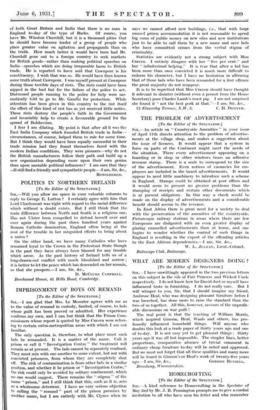IMPRISONMENT OF BOYS ON REMAND
[To the Editor of the SPECTATOR.] SIR,—I am glad that Mrs. Le Mesurier agrees with me as to the value of remand in custody, limited, of course, to lads whose guilt has been proved or admitted. Her experience confirms my own, and I can but think that the Prison Com- missioners whose report is quoted by Miss Craven were referr- ing to certain extra-metropolitan areas with which I am not familiar.
The only question is, therefore, to what place must such lads be remanded. It is a matter of the name. Call it prison or call it " Investigation Centre " the treatment will remain as at present. The lads cannot be separately confined. They must mix with one another to some extent, but not with convicted prisoners, from whom they are completely shut off. The risk of contamination is from other lads in a similar position, and whether it be prison or " Investigation Centre," the risk could only be avoided by solitary confinement, which no one would suggest. There remains the stigma " of the name " prison," and I still think that this, such as it is, acts as a wholesome deterrent. I have no very serious objection to calling the " remand " part of the prison premises by another name, but I am entirely with Mr. Clynes when he says we cannot afford new buildings, i.e., that with large unused prison accommodation it is not reasonable to spend big sums of public money on new sites and new institutions just to be able to call them by a new name and save lads who have committed crimes from the verbal stigma of criminality.
Statistics are evidently not a strong subject with Miss Craven. I entirely disagree with her " five per cent." and her " infinitesimal helping." It is true that after a lad has been more than once convicted it is much more difficult to redeem his character, but I have no hesitation in affirming that of those lads who have been remanded for a first offence the great majority do not reappear.
It is to be regretted that Miss Craven should have thought it relevant to disinter (without even a permit from the Home Secretary) poor Charles Lamb's roast pig. I am not surprised she found it " not the best pork at that."—I am, Sir, &c., 12 Elsworthy Terrace, N.W. 3. C. H. DENYER.






































 Previous page
Previous page